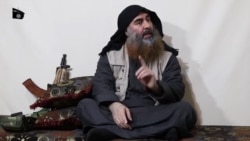The Islamic State terror group appears to be trying to show that momentum is building in support of its new leader, distributing photographs of fighters from various provinces and affiliates swearing allegiance.
Since Saturday, IS media officials have posted a series of photos showing fighters from five of the group's affiliates gathering to pledge bay'ah (allegiance) to Abu Ibrahim al-Hashimi al-Qurashi.
The first of the pledges came from IS-Sinai of IS distributing three photographs of about 25 masked fighters gathering in a sparsely wooded area in Egypt's Sinai Peninsula, with guns raised.
That release was followed hours later by a series of photographs showing a group of about seven or eight masked fighters, allegedly from Bangladesh, pledging their loyalty.
IS media officials have since distributed more photographs, similarly showing masked gunmen from Yemen and Pakistan pledging allegiance.
"Some of this is, we're seeing some of the weaker affiliates rapidly realign with Islamic State," said Katherine Zimmerman, project manager with the American Enterprise Institute's Critical Threats Project.
"Four of the five are actually pretty small affiliates — Yemen, Somalia, Bangladesh and Pakistan — that haven't really had a massive presence on the ground and don't seem to have the sort of global pull that other ISIS branches have had," she added.
The exception is IS-Sinai, the first of the terror group's affiliates to give bay'ah to Qurashi.
Western intelligence officials have long pointed to IS-Sinai as one of the terror group's most dangerous affiliates, suspected of planting a bomb aboard a Russian airliner in 2015, killing 244 people.
Unlike IS affiliates in Bangladesh, Yemen and Somalia, which each have an estimated few hundred followers, IS-Sinai is thought to have anywhere from 500 to 1,200 fighters in cells scattered across the Sinai Peninsula and Egypt's Nile Valley.
Still, U.S. officials believe IS-Sinai has been dependent on the core group in Syria and Iraq for some of its funding, which would give it a reason to quickly back the new leader.
Officials and analysts say it may be more telling if or when fighters with IS-Khorasan in Afghanistan or IS-West Africa, with an estimated 3,500 fighters, come forward to pledge their loyalty to Qurashi.
"Those are two of the strongest Islamic State branches, and we've yet to hear from them," Zimmerman said.
'Risk of defections'
While there has been a sense in the intelligence community that most of the IS affiliates will eventually fall in line behind Qurashi, some may be trying to feel out the terror group's core leadership to see if financial and logistical support will continue.
They may also want more information about Qurashi's true identity, to evaluate whether he can bring the same cache as Abu Bakr al-Baghdadi, who helped guide IS from a struggling insurgency into one of the world's most feared terror organizations.
"There is also the perception that ISIS was simply gaining ground in the world of jihadism," Daveed Gartenstein-Ross, a counterterrorism analyst and CEO of Valens Global, told VOA prior to Thursday's announcement that Qurashi is now in charge.
"If the new leader is not seen as a sufficient replacement for Baghdadi, then they do face the risk of defections," he said.
Building momentum
To convince affiliates, IS's core leadership may have no choice but to find ways to securely share additional information about Qurashi, who for now is known to Western officials only by his kunya, or nom de guerre.
There may also be questions about why, for now, IS has only released still photographs, in contrast to a series of videos the group released in June of IS fighters and affiliates renewing their bay'ah to Baghdadi.
But analysts caution IS officials would be playing a dangerous game if the photos are not what they claim to be.
"Old photos, anything taken more than four days ago, would really throw ISIS media credibility in doubt (to their own base)," said researcher Raphael Gluck, using another acronym for the group.
At the same time, by gradually releasing the information, the terror group's media officials are playing to the desires of their followers.
"The ISIS affiliates like the synchronization," said Gluck, a co-founder of Jihadoscope, a company that monitors online activity by Islamist extremists. "It shows strength and ability to respond."
Early indications are that the strategy of gradually building momentum appears to be working.
"ISIS supporters on social media platforms seem to have a renewed sense of belonging since the announcement of the new caliph," according to Chelsea Daymon, a terrorism and security researcher at American University.
"Supporters are definitely keeping track of what's being written and said," she added.






